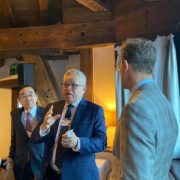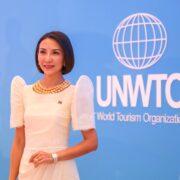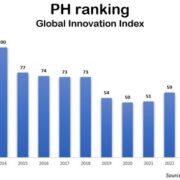
Davos, Switzerland — Trade and Industry Secretary Ramon M. Lopez contributed to three sessions during the 50th World Economic Forum held on 21 to 24 January in Davos. Sec. Lopez talked about the impact of technologies on trade, easing investments worldwide, and the future of trade and global economic interdependence. In some bilateral meetings, He also highlighted President Rodrigo Roa Duterte’s focus on inclusive globalization, where bigger economies extend support and market access to smaller economies to ensure that trade benefits all, especially developing countries.
Secretary Lopez and Permanent Representative to the World Trade Organization (WTO), Amb. Manuel A.J. Teehankee served as the official representatives of the Philippines to the WEF. For the last 49 years, the WEF, as the premier gathering for world business, political, academic and other leaders of society, has sought to improve the state of world by shaping global, regional and industry agendas.
World Trade Organization (WTO) events were also topline agenda for the Philippine delegation in Davos, with Secretary Lopez participating in four WTO-related ministerial meetings on 23 and 24 January.
On 23 January, at the ministerial gathering on the Joint Initiative on Investment Facilitation for Development, which seeks to craft new WTO rules to propel investment flows worldwide, Secretary Lopez batted for improved transparency and predictability in investment rules, the easing of administrative procedures, the enhancement of international cooperation, sharing of best practices, and prevention of disputes. At that gathering, Secretary Lopez announced that the Philippines is joining the 98 other WTO Members in negotiations towards new rules on investment in the WTO.
Later that day, Secretary Lopez represented Agriculture Secretary William Dar at a Ministerial Meeting of the Cairns Group, a group of non-subsidizing agricultural exporters that seek to reduce distortions in markets primarily caused by known heavy subsidizers of production and trade. In his statement, Secretary Lopez called on Members to improve notifications, since reforms in subsidies will only be as good as the baseline data from which reductions will begin. Secretary Lopez also appealed for reforms in the area of market access to help countries like the Philippines reverse the damage that highly subsidized farm products from abroad cause Filipino farmers.
At the Ministerial Meeting on Electronic Commerce on 24 January, Secretary Lopez boosted the ongoing drive of more than 80 WTO Members in crafting future rules on e-commerce in the WTO. These rules are founded on the following broad themes: facilitating electronic transmissions, non-discrimination and liability, consumer protection, and transparency and cooperation, among others. Secretary Lopez highlighted the enabling platform that e-commerce presents especially to micro, small and medium enterprises, or MSMEs and the related initiatives on investments and trade facilitation.
On the same day, Switzerland organized a ministerial gathering in preparation for the 12th WTO Ministerial Conference. At this gathering, Secretary Lopez shared his views on ongoing reform proposals in the WTO. This covered transparency and notification, the functioning of WTO bodies, and the treatment of developing countries. He also made a pitch for the existing negotiating mandate in agriculture under the 19-year-old Doha Development Agenda (the Doha Round).
Secretary Lopez reiterated the Philippines’ support for the negotiations on e-commerce and investment facilitation for development, which are joint initiatives of a large proportion of WTO Members aimed at inclusive globalization and shared prosperity for all. He then gave special attention to the critical phase of negotiations on disciplines on fisheries subsidies and called for complete prohibition of subsidies to IUU (illegal, unreported and unregulated) fishing and tight disciplines on subsidies that encourage overcapacity and overfishing, all of which contribute to resource depletion. Secretary Lopez also backed the fishery-dependent archipelagos’ need for policy space, since archipelagos like the Philippines hardly subsidize, yet need to allow small industries to develop, as well as help fisherfolk with their livelihood.
In the past four days, Secretary Lopez also held bilateral meetings with Edward Yau, Hong Kong’s Secretary for Commerce and Economic Development, and the trade ministers of Korea and Chile. He also talked to the chiefs of Tyson Foods, Procter & Gamble, and Novartis to advance business interests of the Philippines.





